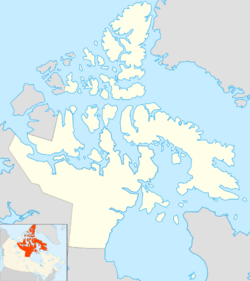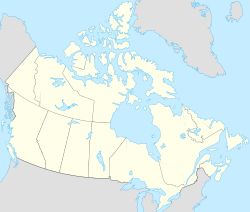Mair Island facts for kids
| Geography | |
|---|---|
| Location | Frobisher Bay |
| Coordinates | 63°40′N 68°25′W / 63.67°N 68.41°W |
| Archipelago | Canadian Arctic Archipelago |
| Administration | |
|
Canada
|
|
| Nunavut | Nunavut |
| Region | Qikiqtaaluk |
| Demographics | |
| Population | Uninhabited |
Mair Island is a small, uninhabited island located in the cold, northern part of Canada. It's one of many islands found in the vast Canadian Arctic Archipelago, a huge group of islands stretching across the Arctic Ocean. This island is part of the Qikiqtaaluk Region in Nunavut, Canada's largest and northernmost territory.
Contents
Exploring Mair Island
Mair Island is a quiet, empty place. No people live there permanently. It is one of many islands that dot the waters of Frobisher Bay. This bay is a large inlet of the Atlantic Ocean that cuts into the southeastern part of Baffin Island.
Where is Mair Island?
Mair Island is found off the coast of Baffin Island, which is the largest island in Canada. It sits in Frobisher Bay, a famous body of water. The island is located southeast of Iqaluit, which is the capital city of Nunavut. Iqaluit is a vibrant community and the largest settlement in the territory.
Nearby Islands
Mair Island is not alone in Frobisher Bay. It has several island neighbors close by. These include Cairn Island, Long Island, McLaren Island, Monument Island, and Sale Island. These islands are all part of the same arctic environment.
Life in the Arctic
The Canadian Arctic is a unique and challenging environment. It is known for its very cold temperatures and long, dark winters. Despite the harsh conditions, many animals and plants have adapted to thrive here.
Arctic Wildlife
While Mair Island itself is uninhabited by people, the surrounding arctic waters and land are home to various wildlife. Animals like polar bears, seals, and different types of birds can be found in the broader region. These animals are well-suited to the cold climate.
Nunavut is a vast territory, mostly covered by tundra. Tundra is a type of landscape where the ground is frozen for most of the year. Only small plants, mosses, and lichens can grow there. This unique environment supports the arctic animals that call it home.
 | Isaac Myers |
 | D. Hamilton Jackson |
 | A. Philip Randolph |



